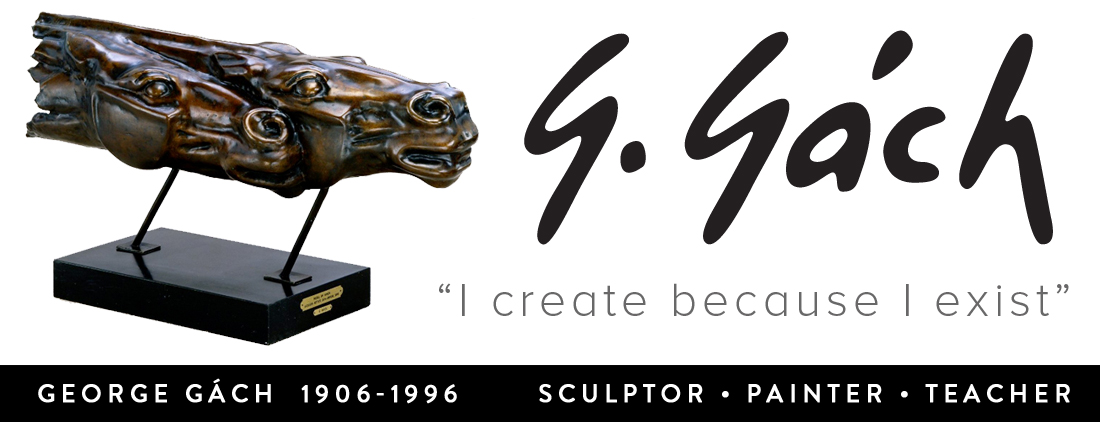LIFE
George Gách (“gahch”) was born in Budapest, Hungary in 1909, the son of the eminent sculptor, Stephen Gách. George studied exclusively with his father until age 18 when he attended the Fine Arts Academy in Budapest. He later became an assistant professor there and was soon recognized as the finest young sculptor in Hungary. At age 30, he was selected to sculpt a bust of the President of Hungary.
Age 14 pastel by his father Steven Gách
George Gách age 80
Initially imbued with the classical traditions of the Beaux-Arts, he soon began sculpting portraits in life-size and reducing them to miniature. As he progressed, he worked in diverse media - wood, stone, bronze, terra-cotta, plastic and steel.
Gold Medal recipient, National Sculpture Society
As a pilot in the Hungarian Air Force during World War II, Gách was shot down and imprisoned by the Russians. He escaped and returned to Budapest. In 1947, feeling threatened by the Communist regine, Gách fled to Beirut, Lebanon where he became a pilot for a middle eastern airline and also taught at the Academy of Fine Arts.
In 1952 Gách came to the United States with his family and decided to devote himself entirely to sculpting, painting, and teaching art. "I can now fly as high as I desire with the fantasy provide by my work." he once remarked. His works embrace all forms of sport rendered into figures in action. His classical background and fine personal expression emerge in religious pieces. Most of Gách's works are individual, unique pieces which display an impelling feeling of movement.
Among the many distinguished awards received by Mr. Gách are the Audubon Artists Medal of Honor in 1966, the Gold Medal of the National Sculpture Society of New York in 1970, the Percival Deitsch Award of the National Sculpture Society of New York in 1974.
He continued to paint and sculpt and travel widely throughout Europe, North and South America and the South Pacific. Among the works he produced in Beirut was a bronze bust of the President of Lebanon.
George Gách was an engaging, energetic and dynamic artist who left a legacy of remarkable artistic achievement.
George Gách 1909-1996
SCULPTOR, PAINTER and TEACHER
Born in Budapest, Hungary, January 27, 1909. Became a US citizen 1952.
Study
Hungarian Academy of Fine Arts, graduate.
Work
Hungarian National Gallery, Budapest, 13 New York and Long Island museums.
Commissions
30 oil portraits, 90 bronze portrait busts; bas reliefs, buildings Texas, Oklahoma, Bermuda.
Exhibitions
35 one-man shows, including Hammer Galleries (New York City), Audubon Artists, Allied Artists, National Sculpture Society.
Listed
Who's Who in American Art.
Teaching
Instructor in sculpture, Academy Budapest Hungary, Academy Beirut Lebanon; 700 private adult students Long Island, New York.
Awards
Gold Medals: National Sculpture Society and National Art League New York, NY, plus others; Medal of Honor, Audobon Artists, New York, NY.
Style
Technique: Classical; Impressionistic/realistic.
Media
Bronze, steel, stone, mosaics, wood carvings, oil paintings.
Sizes
Bronze sculpture: 25 to 40cm high (10 to 16" high); 1,487 unique; created in wax, then cast in bronze; Oil paintings; 50 by 60cm (20 by 24"); 997 unique.
Themes
Horses, people, dance, music, sports, polo, skating, cowboys, boats, cars, flowers, nudes, Bermuda, Mexico, South America, Long Island, New York, South Pacific and Florida.
Bust Commissions
President of Hungary, President of Lebanon, Governor of Colorado, Governor of Bermuda, banker, architect, corporate presidents, doctors, airline captain, Pele, B. Gerald Cantor.
Collectors
Maestro Fausto Cleva, Ambassador Fulton Freeman, Sir John Gascogne, Victor Hammer, Merlin Olsen, Cliff Robertson, Vincent de Roulet, Dr. Howard Rusk, Frank Sinatra.
Family
Wife, 3 children, 6 grandchildren. Studio/Museum: Roslyn, Long Island, New York.



